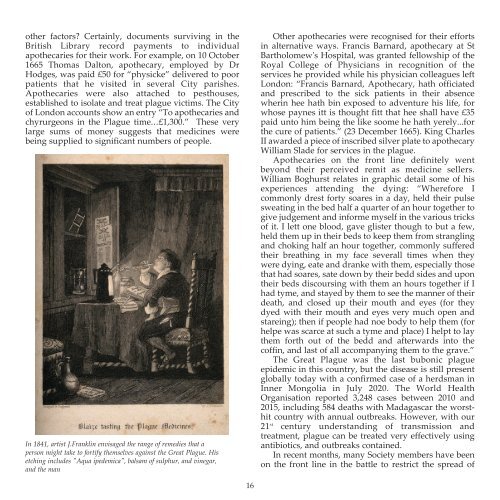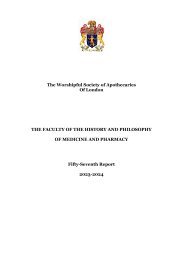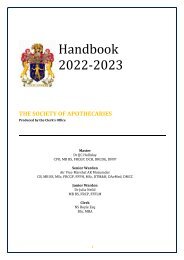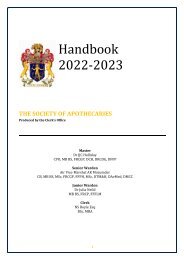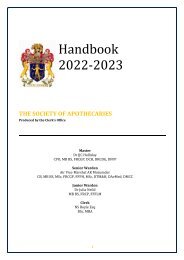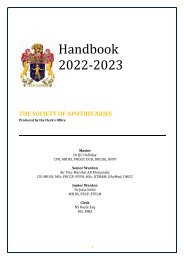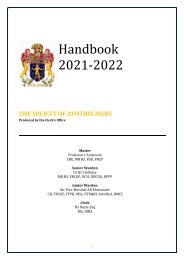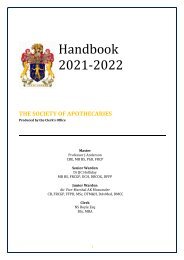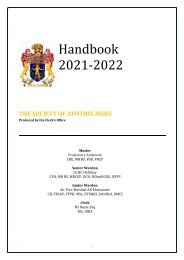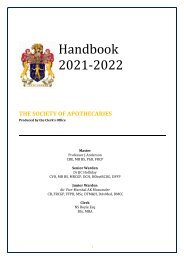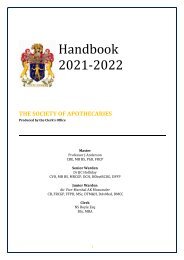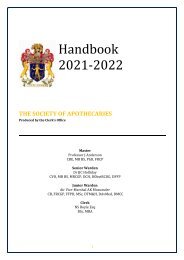Apothecary 2020
Journal of the Worshipful Society of Apothecaries for Master's Year 2019-20
Journal of the Worshipful Society of Apothecaries for Master's Year 2019-20
Create successful ePaper yourself
Turn your PDF publications into a flip-book with our unique Google optimized e-Paper software.
other factors? Certainly, documents surviving in the<br />
British Library record payments to individual<br />
apothecaries for their work. For example, on 10 October<br />
1665 Thomas Dalton, apothecary, employed by Dr<br />
Hodges, was paid £50 for “physicke” delivered to poor<br />
patients that he visited in several City parishes.<br />
Apothecaries were also attached to pesthouses,<br />
established to isolate and treat plague victims. The City<br />
of London accounts show an entry “To apothecaries and<br />
chyrurgeons in the Plague time...£1,300.” These very<br />
large sums of money suggests that medicines were<br />
being supplied to significant numbers of people.<br />
In 1841, artist J.Franklin envisaged the range of remedies that a<br />
person might take to fortify themselves against the Great Plague. His<br />
etching includes "Aqua ipedemica", balsam of sulphur, and vinegar,<br />
and the man<br />
Other apothecaries were recognised for their efforts<br />
in alternative ways. Francis Barnard, apothecary at St<br />
Bartholomew's Hospital, was granted fellowship of the<br />
Royal College of Physicians in recognition of the<br />
services he provided while his physician colleagues left<br />
London: “Francis Barnard, <strong>Apothecary</strong>, hath officiated<br />
and prescribed to the sick patients in their absence<br />
wherin hee hath bin exposed to adventure his life, for<br />
whose paynes itt is thought fitt that hee shall have £35<br />
paid unto him being the like soome he hath yerely...for<br />
the cure of patients.” (23 December 1665). King Charles<br />
II awarded a piece of inscribed silver plate to apothecary<br />
William Slade for services in the plague.<br />
Apothecaries on the front line definitely went<br />
beyond their perceived remit as medicine sellers.<br />
William Boghurst relates in graphic detail some of his<br />
experiences attending the dying: “Wherefore I<br />
commonly drest forty soares in a day, held their pulse<br />
sweating in the bed half a quarter of an hour together to<br />
give judgement and informe myself in the various tricks<br />
of it. I lett one blood, gave glister though to but a few,<br />
held them up in their beds to keep them from strangling<br />
and choking half an hour together, commonly suffered<br />
their breathing in my face severall times when they<br />
were dying, eate and dranke with them, especially those<br />
that had soares, sate down by their bedd sides and upon<br />
their beds discoursing with them an hours together if I<br />
had tyme, and stayed by them to see the manner of their<br />
death, and closed up their mouth and eyes (for they<br />
dyed with their mouth and eyes very much open and<br />
stareing); then if people had noe body to help them (for<br />
helpe was scarce at such a tyme and place) I helpt to lay<br />
them forth out of the bedd and afterwards into the<br />
coffin, and last of all accompanying them to the grave.”<br />
The Great Plague was the last bubonic plague<br />
epidemic in this country, but the disease is still present<br />
globally today with a confirmed case of a herdsman in<br />
Inner Mongolia in July <strong>2020</strong>. The World Health<br />
Organisation reported 3,248 cases between 2010 and<br />
2015, including 584 deaths with Madagascar the worsthit<br />
country with annual outbreaks. However, with our<br />
21 st century understanding of transmission and<br />
treatment, plague can be treated very effectively using<br />
antibiotics, and outbreaks contained.<br />
In recent months, many Society members have been<br />
on the front line in the battle to restrict the spread of<br />
16


